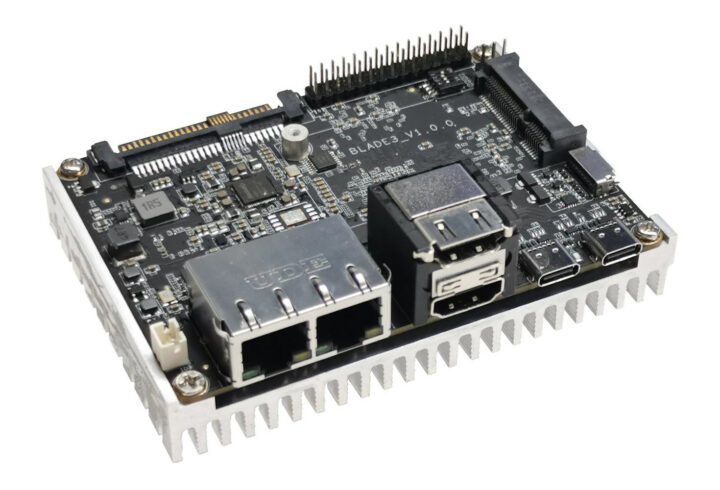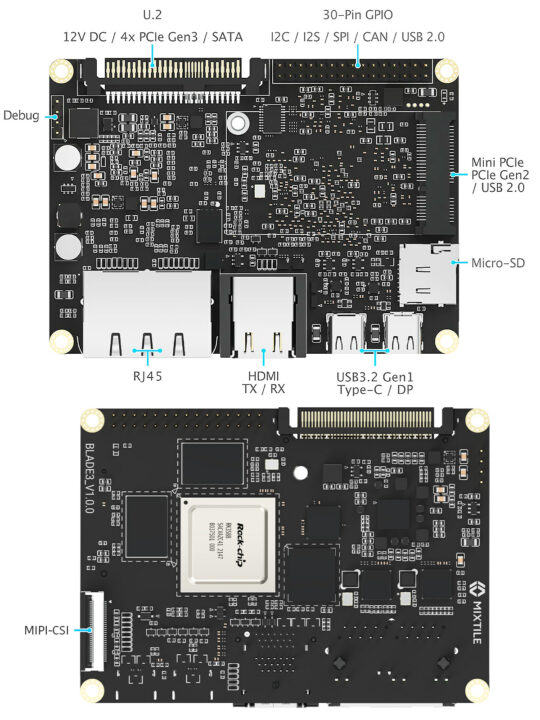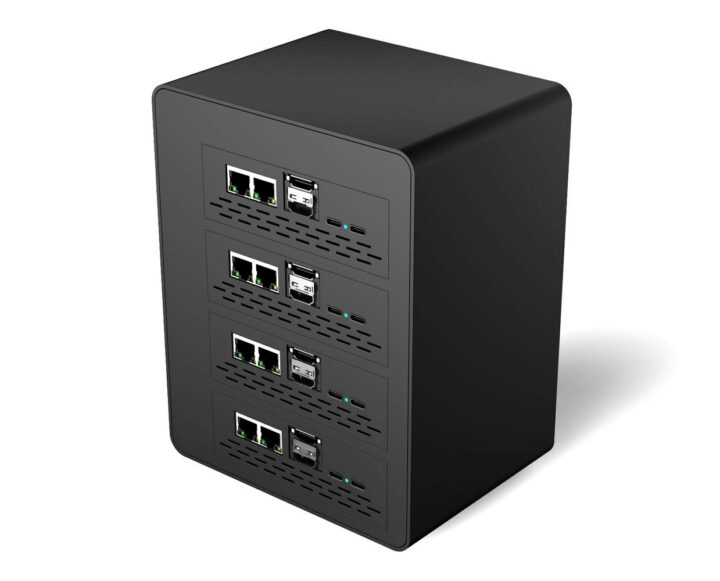The Mixtile Blade 3 Pico-ITX single board computer (SBC) powered by Rockchip RK3588 processor has now launched on Crowd Supply with either 8GB or 16GB RAM, and an optional four-node cluster box with a built-in PCIe switch designed to accommodate four Mixtile Blade 3 boards.
The board also comes with up to 128GB of storage, two 2.5GbE interfaces, HDMI 2.1 output, HDMI 2.0 input, USB 3.2 Gen 1 USB Type-C ports, as well as a mini PCIe Gen 2 for expansion and a 30-pin GPIO header for expansion, as well as U.2 edge connector with 12V, PCIe x4 Gen 3 and SATA signals to interface with other Mixtile boards and build clusters.
Mixtile Blade 3 specifications:
- SoC – Rockchip RK3588 octa-core processor with four Arm Cortex-A76 cores @ up to 2.4 GHz, four Arm Cortex-A55 cores, Arm Mali-G610 MP4 quad-core GPU with support for OpenGL ES3.2, OpenCL 2.2, Vulkan1.1, 6 TOPS NPU, 48MP ISP, 8Kp60 video decoding, 8Kp30 H.264/H.265 video encoding
- Memory & storage configurations
- 4GB LPDDR4 and 32GB eMMC flash
- 16GB LPDDR4 and 128GB eMMC flash
- Common – MicroSD 3.0 card socket; SATA 3.0 and PCIe (NVMe) via U.2 edge connector,
- Video interfaces
- HDMI 2.1 output up to 8Kp60 or 4Kp120
- 4-lane MIPI DSI
- DisplayPort 1.4a via USB-C ports
- HDMI 2.0 input up to 4Kp60
- MIPI CSI camera interface
- Networking – Dual 2.5 Gigabit Ethernet RJ45 ports with link aggregation
- USB – 2x USB 3.2 Gen1 Type-C ports with DisplayPort 1.4a Alt. mode
- Expansion
- U.2 edge connector with 4-lane PCIe Gen3, SATA 3.0, 12V
- Mini PCIe socket with PCIe Gen 2.1 and USB 2.0
- 30-pin GPIO header with GPIOs, I2C, USB 2.0, TTL UART, SPI, I2S, CAN
- Power Supply – 12V DC via U.2 connector (“standard SATA power in”)
- Dimensions – 100 x 72 mm (2.5-inch Pico-ITX form factor)
- Temperature Range – 0 to +80°C
As discussed in the initial announcement, Mixtile does not directly offer Linux support, but instead, runs a Linux container within the Android 12 image preloaded on the board. What’s new is the board will ship with a large heatsink in a design similar ODROID-N2+ board for instance. The documentation does not seem to be up yet, but the support forum is.
The company says it’s possible to create a cluster of 75 Mixtile Blade 3s in a 19-inch 2U chassis with up to 600 processor cores while drawing less than 1500 W of power. For smaller deployments and evaluation, there’s also a four-node cluster box to create a neat system instead of going the usual acrylic case and spacers setup.
Typical applications for the Mixtile Blade 3 include on-premise high-performance servers, low-power HPC cluster nodes, advanced HMI systems with extensive image processing capabilities, compact computing clusters, high-density server integrations for MLOps deployments, big-data storage and processing for 3D graphics and AI applications, edge computing for autonomous vehicles, real-time video streaming and more.
The Rockchip RK3588 Pico-ITX board is available on Crowd Supply for $169 with 4GB RAM and 32G eMMC flash, and $259 in 16GB/128GB configuration. The 32GB RAM model is not offered yet, and I don’t think any company is currently selling RK3588 hardware with 32GB RAM despite the various announcements to the contrary. A $239 pledge is asked for the four-node cluster box. We don’t have many details about it, except “the batteries are not included”. So I’d assume there may be a UPS function too? Shipping adds $10 to the US, and $20 to the rest of the world, with deliveries scheduled to start by the end of October 2022.

Jean-Luc started CNX Software in 2010 as a part-time endeavor, before quitting his job as a software engineering manager, and starting to write daily news, and reviews full time later in 2011.
Support CNX Software! Donate via cryptocurrencies, become a Patron on Patreon, or purchase goods on Amazon or Aliexpress








RTC battery? As supposedly you can’t even ship those by air.
In they comparison table they say that Firefly ITX-3588J is limited to 16GB, it is limited to 32GB instead, as the page linked in the table say. The same way they say no SATA/PCI available theere are 4 SATA 3.0 connectors and a PCIe 3.0 port on board.
The mixtile guys brag about their ‘special’ connector (breaking out SATA and PCIe Gen3 x4 via U.2) and wrt RK3588 and 32 GB RAM see Tom Cubie’s (Radxa) comment: https://www.cnx-software.com/2022/05/17/turing-pi-2-mini-itx-cluster-board-supports-rk3588-turing-rk1-raspberry-pi-cm4-and-nvidia-jetson/#comment-592596
Allow me to explain the idea behind this ‘special’ connector. As cluster nodes, interconnecting via PCIe Gen3 means the theoretical bandwidth is 32 Gb/s with an end-to-end latency of 1μs. Using a U.2 connector balances the performance, cost, and convenience of replacing a part. Yes, we are trying to build a cost-efficient heterogeneous-ISA cluster platform.
Well, we all know that PCIe Gen3 is 8 GT/s per lane with 128b/130b coding. And that a ‘2 node setup’ can use all four lanes between those 2 nodes exclusively. What we don’t know is what you designed for 3, 4 or even more nodes.
It will really help if you provide docs and diagrams as promised already weeks ago. 🙂
Martin, I too would appreciate tkaiser’s request for a clear diagram of the topology of the system.
If I understand correctly, RK3588 should have both PCIe root and endpoint ability, and furthermore a cluster will require a separate board with a PCIe switch. Is this separate board being provided in the crowdfunding?
Martin, don’t be discouraged by comments here, I think I can see what you’re trying to do. Of course you’ll be competing with other solutions on cost, performance, density, and power. And, for people like me, open and significant documentation, from the firmware up, is necessary, otherwise I’ll stick to known devils rather than unknown ones.
All the best.
Thank you @uiop . I will put my time to generate more documentation.
I’m still interested in seeing how you’ll make this work and how the software will deal with this. I guess you’ll use it in RDMA-like fashion with inter-nodes memory mapping and probably some inter-node interrupts, but this does require specific drivers and software.
Another approach (but more expensive, yet probably more scalable) could be to connect a 25GbE NIC to the PCIe port, and have them all interconnected with a 8x25GbE switch, such as Marvell’s 98dx7308. This way it becomes totally standard again, at an extra cost. But for latency it’s obviously different, as a single 4kB page would take 1.3 microseconds of serialization time vs 1 microsecond with raw PCIe. However the latency remains the same between all nodes, it’s no more a daisy chain mode, so there are pros and cons.
RDMA is our further plan. We’re focusing on the IP-over-PCIe driver, which is not that good on the performance but is easier to understand by users and compatible with existing software.
OK thanks Martin for the explanation. I’ll have a look at your doc once available. I’m not aware of any standard way to transport IP over PCIe, and am quite curious about your design, which is in part why I’m a bit insistent here. There’s no rush for me but I just want to be sure this will eventually be documented.
Hey, may I ask if your team comes from China? If so, I’d like get in contact with you to order some boards in a more direct way, rather than crowdfunding.
We’re located in Shenzhen, and welcome to contact us directly. But for retail, this batch of boards must be sold exclusively via Mouser.
Mixtile has posted a FAQ on Crowd Supply, and the reason for the lack of hardware with 32GB RAM is the supply chain:
It remains a really nice board, especially with the included full-size heatsink. Still too bad Linux is not the focus for now (but as usual, rockchip’s more to blame for not having started to mainline their 3588 code).
According to their calculation, a board would consume 20W at full load, that starts to become non-negligible, and one must pay serious attention to the cooling!
We have changed our roadmap according to the majority’s feedback. The Mixtile Blade 3 will ship with Debian 11 preloaded.
At this point in time all you can due is glueing together Rockchip’s BSP kernel with some Linux userland (which is what we see in the SBC world since a decade now and what led to some of us improving things).
Devs will measure you on how easy it will be to compile the kernel, build drivers (Linux headers available and working) and so on.
Thanks, that effort will be much appreciated and should bring quite some value to your product by making it immediately more usable.
Rest assured that there are several phases when selling such bleeding edge products. First, people are impressed and brag everywhere to show the shiny new nice product they just bought. Second they face issues and start to report them. And third if they see they can’t get fixes quickly due to some crappy BSP that’s out of your control, and particularly if that issue is already fixed in mainline but they can’t use a fixed kernel on their board, they’ll start to complain loud (which is understandable when they put quite some money in a cluster). Thus you’ll need to be responsive from the beginning, and try not to depend too much on RK to fix bugs because it’s not exactly their specialty :-/
Good luck with your original and innovative product!
Without Linux support, it is no attractive choice.
Does preload Debian 11 make it more attractive?
Simple benchmark: will your Debian ship with
I would believe the answer is 1) since upstream Debian kernel doesn’t support the hardware and you most probably lack the resources to patch up RK’s BSP kernel to latest LTS version to fix a lot of security exploits on the way?
Let’s wait and see, Thomas. There are quite a few vendors arriving with RK3588, with a bit of luck each of them will fix one bug or another and in the end a non-official fork of RK’s BSP will appear on github, like it did for 3288 or 3399 long ago. That’s not an enviable situation but it’s less risky than seeing a single vendor choosing one chip. We’d definitely need NXP to make A76 or higher. At least they do get 100% functional mainline kernels and do not annoy users with crappy and insecure BSPs.
If they rally want this as blade board they should keep it as simple as possible.
NO HDMI in and out. Just one ethernet, NO GPIO and other useless stuff and board should be smaller as possible, Just compute blade board
> If they rally want this as blade board they should keep it as simple as possible
They do not (read the other use cases this board is advertised for). While RK3588 might be the SBC SoC with highest CPU horsepower from the ‘somewhat affordable’ category it’s not that impressive so IMO it makes sense to be able to use media capabilities as well.
Given the consumption under full load there are hard thermal limits for cramping as much such boards into a rack unit anyway.
We have another model (for high-density servers only) of Blade 3 with the same size but no RJ45/HDMI/USB-C/GPIO/eMMC. It boots from SPI flash and then joins the cluster.